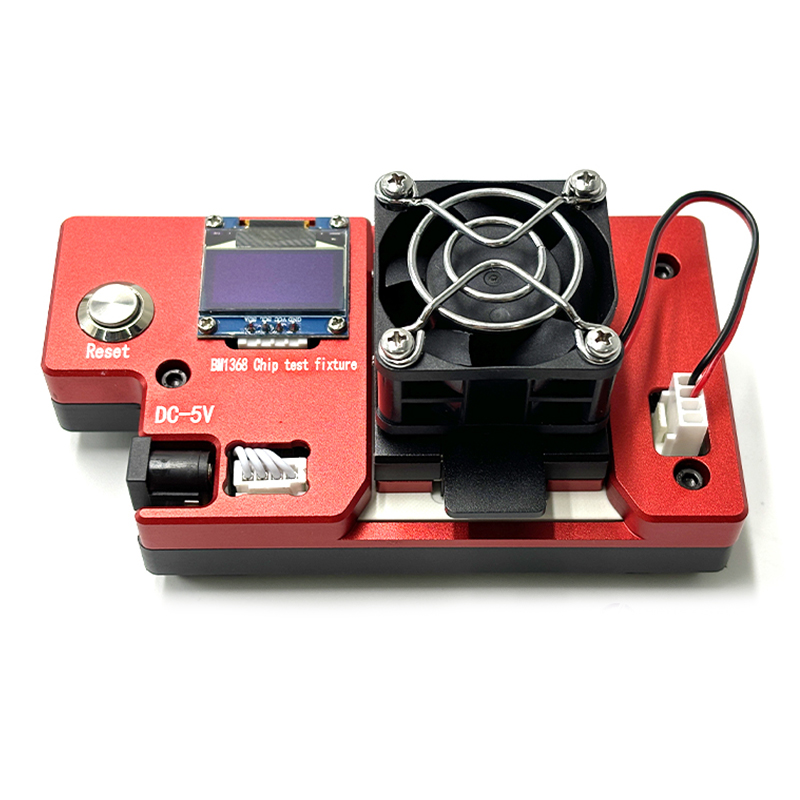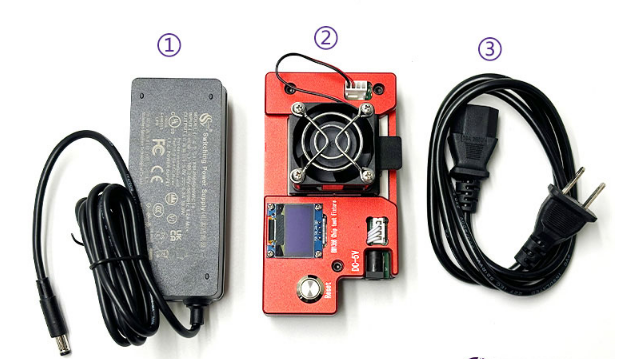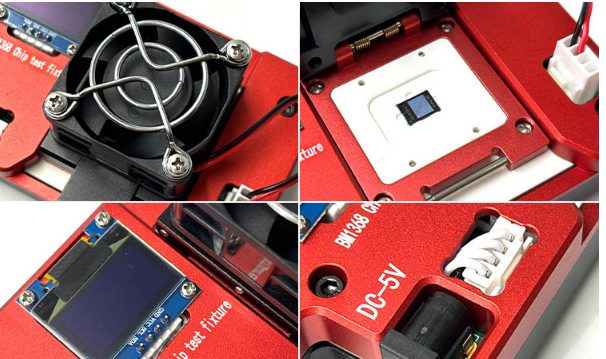What types of failures can BM1368 Series ASIC Chip Tester detect?
February 18, 2025
What Types of Failures Can BM1368 Series ASIC Chip Tester Detect?
The cryptocurrency mining industry relies heavily on the efficiency and reliability of mining hardware, particularly ASIC chips. As mining operations scale up, the need for precise diagnostic tools becomes critical to minimize downtime and maximize productivity. Enter the BM1368 Series ASIC Chip Tester, a state-of-the-art diagnostic instrument engineered specifically for the comprehensive testing and validation of BM1368 series ASIC chips. This advanced tool is designed to address the challenges faced by mining facility maintenance teams and professional repair centers, offering unmatched accuracy and efficiency in chip diagnostics.

In this article, we’ll explore the types of failures the BM1368 Series ASIC Chip Tester can detect, its practical applications, and how it revolutionizes the maintenance workflow for mining operations.
Introduction to the BM1368 Series ASIC Chip Tester
The BM1368 Series ASIC Chip Tester is a precision testing instrument tailored for the BM1368 family of ASIC chips, including the BM1368PB, BM1368AA, BM1368PA, and BM1368PV variants. Whether you’re testing new chips fresh from production or evaluating pre-owned chips for reuse, this tester provides a unified solution for assessing chip functionality and performance.
With its compact, professional-grade design, the tester features a robust test fixture host powered by a dedicated 5V power supply system. This ensures stable testing conditions, which are essential for accurate diagnostics in demanding mining environments. The tester’s advanced algorithms enable rapid detection of chip failures, helping maintenance teams identify and resolve issues with unprecedented speed.
Key Advantages of the BM1368 Series ASIC Chip Tester
Before diving into the specific types of failures it can detect, let’s first highlight the key advantages that make this tester an indispensable tool for mining professionals:
- Universal Compatibility: Supports all BM1368 series chips, making it a versatile solution for diverse mining setups.
- Rapid Diagnostic Efficiency: Reduces troubleshooting time through instant chip quality assessment.
- Quality Assurance Excellence: Validates both new and pre-owned chips to ensure optimal performance.
- Professional Problem Resolution: Identifies persistent failures that other tools might miss, preventing recurring issues.
- Maintenance Optimization: Enhances workflow efficiency by enabling quick fault detection and verification.
- ROI-Focused Design: Combines compact construction with comprehensive testing capabilities for exceptional value.
- Enhanced Operational Reliability: Ensures only properly functioning chips are deployed, reducing downtime and maintenance costs.
These advantages underscore the tester’s ability to address the most pressing challenges in mining hardware maintenance. Now, let’s explore the specific types of failures it can detect.
Types of Failures Detected by the BM1368 Series ASIC Chip Tester
The BM1368 Series ASIC Chip Tester is equipped with sophisticated diagnostic algorithms that can identify a wide range of chip failures. These failures can be broadly categorized into the following types:
#### 1. Power Supply Failures Power-related issues are among the most common causes of ASIC chip malfunctions. The tester can detect:
- Voltage irregularities: Fluctuations or deviations from the specified voltage range.
- Current leakage: Unintended current flow that can damage the chip over time.
- Power delivery inefficiencies: Inconsistent power supply that affects chip performance.
By identifying these issues early, the tester helps prevent catastrophic failures and extends the lifespan of the chips.
#### 2. Signal Integrity Failures ASIC chips rely on precise signal transmission for optimal performance. The tester can detect:

- Signal attenuation: Loss of signal strength that impacts data processing.
- Noise interference: External or internal noise that disrupts signal clarity.
- Timing errors: Misalignment of signals that affects synchronization.
Detecting these issues ensures that the chips operate at their full potential, maintaining high hash rates and efficiency.
#### 3. Thermal Management Failures Overheating is a significant concern in mining operations, as it can lead to reduced performance and irreversible damage. The tester can detect:
- Thermal runaway: Rapid temperature increases that exceed safe thresholds.
- Heat dissipation inefficiencies: Poor thermal management that leads to localized hotspots.
- Cooling system faults: Issues with cooling components that affect chip temperature.
Identifying thermal failures early allows operators to implement corrective measures, such as improving ventilation or replacing faulty cooling systems.
#### 4. Functional Failures These are failures related to the chip’s core functionality, which directly impact mining performance. The tester can detect:
- Hash rate degradation: Reduced computational power that lowers mining efficiency.
- Algorithm execution errors: Malfunctions in the chip’s ability to perform cryptographic calculations.
- Data processing faults: Errors in handling and transmitting data.
By pinpointing these issues, the tester ensures that only fully functional chips are deployed in mining operations.
#### 5. Physical and Structural Failures Physical damage to the chip or its components can also lead to failures. The tester can detect:
- Soldering defects: Poor connections between the chip and its substrate.
- Cracked or damaged dies: Physical damage to the chip’s silicon layer.
- Corrosion or contamination: Environmental damage that affects chip performance.
Identifying physical failures helps operators determine whether a chip can be repaired or needs replacement.
#### 6. Persistent and Recurring Failures Some failures persist even after multiple repair attempts, leading to recurring issues. The tester can detect:

- Hidden defects: Issues that are not immediately apparent during routine inspections.
- Intermittent failures: Problems that occur sporadically and are difficult to diagnose.
- Chronic malfunctions: Long-standing issues that affect chip reliability.
By uncovering these persistent failures, the tester helps prevent costly downtime and ensures long-term operational stability.
Practical Applications of the BM1368 Series ASIC Chip Tester
The BM1368 Series ASIC Chip Tester is not just a diagnostic tool; it’s a vital component of any mining operation’s maintenance strategy. Here are some practical applications:
- Quality Control for New Chips: Ensure new chips meet performance standards before deployment.
- Evaluation of Pre-Owned Chips: Assess the condition of used chips for reuse in mining rigs.
- Routine Maintenance Checks: Perform regular diagnostics to identify and address issues early.
- Troubleshooting Complex Failures: Diagnose persistent or intermittent problems that other tools cannot detect.
- Optimizing Mining Efficiency: Deploy only fully functional chips to maximize hash rates and reduce energy consumption.
Conclusion
The BM1368 Series ASIC Chip Tester is a game-changer for cryptocurrency mining operations, offering unparalleled diagnostic capabilities for BM1368 series ASIC chips. By detecting a wide range of failures—from power supply issues to persistent malfunctions—this tool helps mining professionals maintain optimal performance, reduce downtime, and extend the lifespan of their hardware.
For mining facility maintenance teams and professional repair centers, investing in the BM1368 Series ASIC Chip Tester is a strategic move to enhance operational reliability and maximize ROI. Its universal compatibility, rapid diagnostic efficiency, and professional-grade design make it an essential tool in the fast-paced world of cryptocurrency mining.